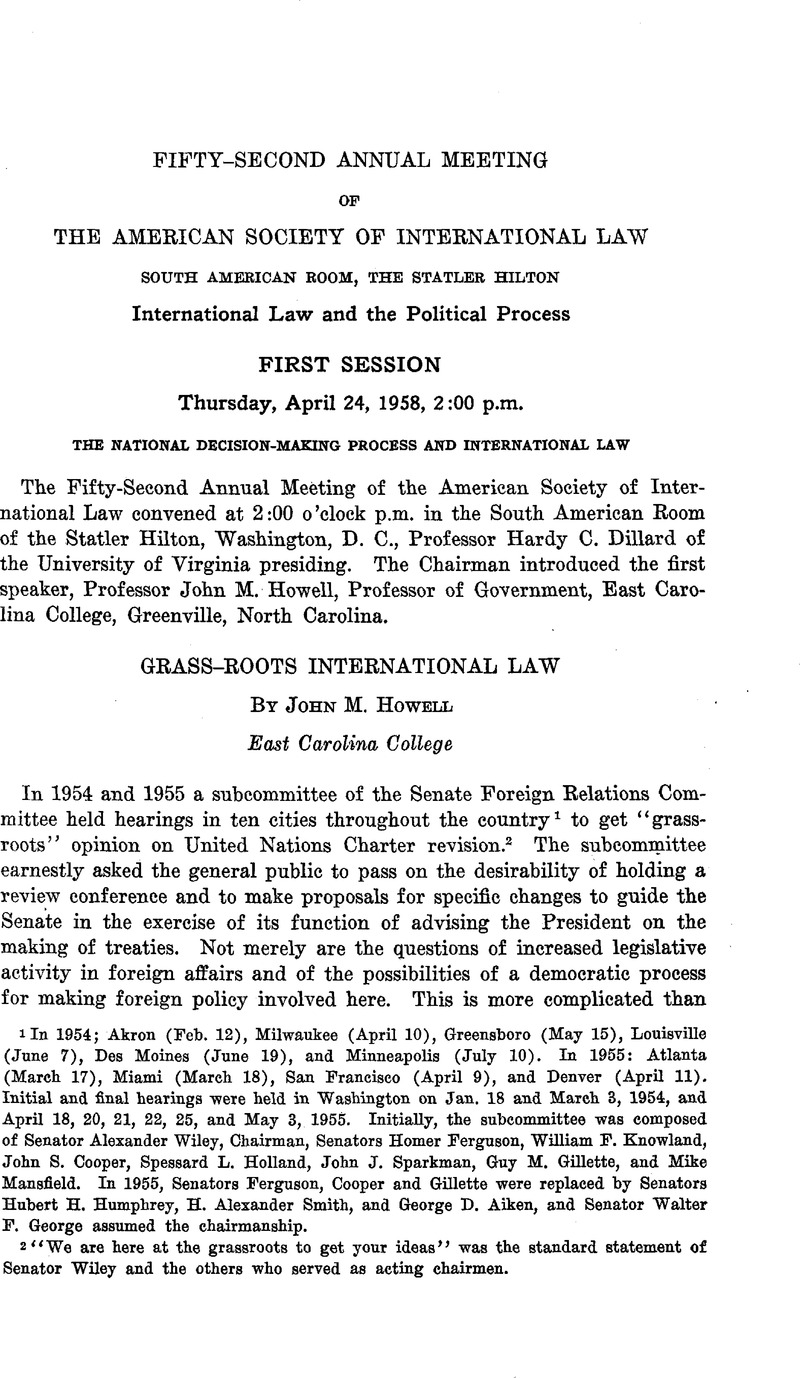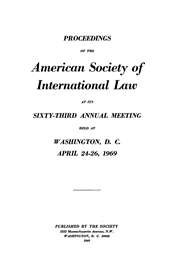No CrossRef data available.
Article contents
Grass–Roots International Law
Published online by Cambridge University Press: 27 February 2017
Abstract

- Type
- First Session
- Information
- Copyright
- Copyright © American Society of International Law 1958
References
1 In 1954; Akron (Feb. 12), Milwaukee (April 10), Greensboro (May 15), Louisville (June 7), Des Moines (June 19), and Minneapolis (July 10). In 1955: Atlanta (March 17), Miami (March 18), San Francisco (April 9), and Denver (April 11). Initial and final hearings were held in Washington on Jan. 18 and March 3, 1954, and April 18, 20, 21, 22, 25, and May 3, 1955. Initially, the subcommittee was composed of Senator Alexander Wiley, Chairman, Senators Homer Ferguson, William F. Knowland, John S. Cooper, Spessard L. Holland, John J. Sparkman, Guy M. Gillette, and Mike Mansfield. In 1955, Senators Ferguson, Cooper and Gillette were replaced by Senators Hubert H. Humphrey, H. Alexander Smith, and George D. Aiken, and Senator Walter F. George assumed the chairmanship.
2 “We are here at the grassroots to get your ideas” was the standard statement of Senator Wiley and the others who served as acting chairmen.
3 See Perkins, James A., “Congressional Investigations of Matters of International Import,” 34 American Political Science Review 284 (1940).CrossRefGoogle Scholar
4 For an evaluation of methodology in this type of study, see Ralph K. Huitt, “The Congressional Committee: A Case Study,” 48 ibid. 340–365 (1954).
5 Huitt, loc. cit. 341–343, has a good summary of various rôles.
6 S. Res. 126, 83d Cong., 1st Sess.
7 Review of the United Nations Charter, Hearing Before a Subcommittee of the Committee on Foreign Relations, U. S. Senate, 83d Cong., 2d Sess., p. 152 (cited here after as Hearing. The hearings are in twelve parts with an additional part comprising an index, but the pagination for the entire publication is consecutive. Dates of each hearing are given in note 1, above).
8 Ibid. 575.
9 Ibid. 466, 575, 904.
10 Ibid. 468, 575.
11 Ibid. 727–728.
12 Ibid. 791–792.
13 Ibid. 304.
14 In one exception, Senator Sparkman, who seldom asked questions or commented, was provoked by a particularly partisan attack to say: “ I want to say to you, sir, that I resent the entire statement.” Ibid. 1389. In Atlanta, the subcommittee mildly cross-examined. two members of the D.A.R. by asking for specific examples when they charged United Nations invasion of domestic jurisdiction. Neither could do so. Ibid. 915, 934.
15 Ibid. 845. Senator Mansfield drew out a pro-United Nations witness on the possibility of our living in isolation after a witness proposed withdrawal. Ibid. 193–194. Following Senator Bricker’s statement, several Senators joined in to refute it by asking questions of Ernest A. Gross, former deputy United States Representative to the United Nations. Senator Smith, who had taken issue with Bricker on the dangers of the United Nations, asked Gross if he agreed with this rebuttal. Ibid. 1653, 1671.
16 Ibid. 851.
17 Ibid. 808.
18 Ibid. 247–248.
19 Ibid. 1618–1641, 1741–1753.
20 “United Nations Charter Review,” 1954 Proceedings of the American Society of International Law 194.
21 Approximately one fifth of the witnesses in Greensboro were professors.
22 For example, in Atlanta a marked increase in the D.A.R. representation was some-what offset by an increase in Business and Professional Women’s Club representation and other women’s organizations. In this connection, consider the statement that women are apparently less attentive than men on matters of foreign policy, in Gabriel A. Almond, The American People and Foreign Policy 121 (1950).
23 Hearing, p. 1684. One V.F.W. member deviated and Senator Wiley commented on the fact. The witness acknowledged that material was sent down from national headquarters, though it was not ordinarily discussed in his local post. Ibid. 232.
24 For examples of this kind of co-ordination, see ibid. 422, 501, 913, 1114, 1460, 1646, 1650, 1924.
25 Ibid. 1618.
26 For discussion on access, see Truman, David B., The Governmental Process 321–351 (1951).Google Scholar
27 Hearing, pp. 1926-1950.
28 Ibid. 1001.
29 Statement of Dean Paul Shipman Andrews, ibid. 1889.
30 Ibid. 1925.
31 When Mrs. Franklin D. Roosevelt appeared before the subcommittee, the questions and answers filled approximately twenty pages of the record. Ibid. 1803–1822.
32 New York Times, June 30, 1953, p. 18.
33 In the San Francisco hearing, Senator Knowland asked searching questions that sometimes put supporters of a stronger United Nations on the spot. In other hearings, Senators Gillette and Humphrey tended to be unusually friendly to international cooperationists. The conclusion on the whole subcommittee conforms to William S. White’s conclusion that the spokesmen of the patriotic organizations and supporters of “extreme innovations” make “almost no real impression on the Senate.” Citadel: The Story of the U. S. Senate 145, 166 (1957). See also Ernest S. Griffith, Congress: Its Contemporary Role 112–115 (1951).
34 Hearing, pp. 861, 863.
35 The answer is printed in the Hearing at page 1980.
36 S. Rep. No. 1305, 84th Cong., 1st Sess., p. 3.
37 Senator Wiley, for example, seemed to be intent on placing the blame for United Nations failures on the Soviet Union. Griffith, op. cit. 2, refers to the “preoccupation” of Congress with the issue of Communism.
38 Two witnesses proposed that Esperanto be adopted as an official United Nations language. Hearing, pp. 1113, 1159. Another proposed an essay contest to stimulate interest in the United Nations. Ibid. 379.
39 Some of the witnesses, of course, had special competence in this field.
40 S. Doc. No. 164, 83d Cong., 2d Sess.
41 Hearing, pp. 1636, 1653. Joseph E. Johnson, President of the Carnegie Endowment for International Peace, reported that studies of public reaction in foreign countries revealed “generally a lack of enthusiasm for any attempt at sweeping change.” Ibid. 1916.
42 For example see the exchange between Senator Humphrey and C. M. Stanley, President of U.W.F. On Humphrey’s question regarding the similarity of the proposals of U.W.F. and the American Legion, Stanley replied that, oddly enough, they were almost identical. Hearing, pp. 1930–1931.
43 Support for continuing United States membership has remained “virtually constant. “ Cory, Robert H. Jr., ” The Role of Public Opinion in the United States Policies Toward the United Nations,” 11 International Organization 221 (1957).CrossRefGoogle Scholar
44 Hearing, pp. 1981–1982.
45 S. Rep. No. 1305, 84th Cong., 1st Sess., p. 2.
46 S. Rep. No. 1797, 84th Cong., 2d Sess., pp. 2, 4, 37.
47 Cory, loc. cit. 221. Martin Kreisberg reported that 30 percent of the population is unaware of almost any given event in American foreign affairs, 45 percent is aware of important events but cannot be considered informed, and only 25 percent consistently shows knowledge in foreign affairs. In Lester Markel and Others, Public Opinion and Foreign Policy 51 (1949). Regarding these statistics, Cyril O. Houle and Charles A. Nelson, The University, the Citizen, and World Affairs 79 (1956), said seasoned observers were not surprised, though they questioned whether the figure of 25 percent was not too high.
48 In two of the hearings the chairman was alone except for visiting Senators and representatives; in five hearings two members were present; in three hearings three were present. With the exception of Senator Wiley, who attended six hearings, no Senator attended more than three hearings outside Washington. Attendance in Washington was better.
49 On this point, see Elder, Robert E., “The Public Studies Division of the Department of State: Public Opinion Analysts in the Formulation and Conduct of American Foreign Policy,” 10 The Western Political Quarterly 783-792 (1957).CrossRefGoogle Scholar
50 On this issue compare Griffith, op. cit. 94, 98, and Dean Acheson, A Citizen Looks at Congress 70 (1956).
51 Oliver, Covey T., “Relation of International Law to International Relations,” 1954 Proceedings of the American Society of International Law 112–113.Google Scholar




